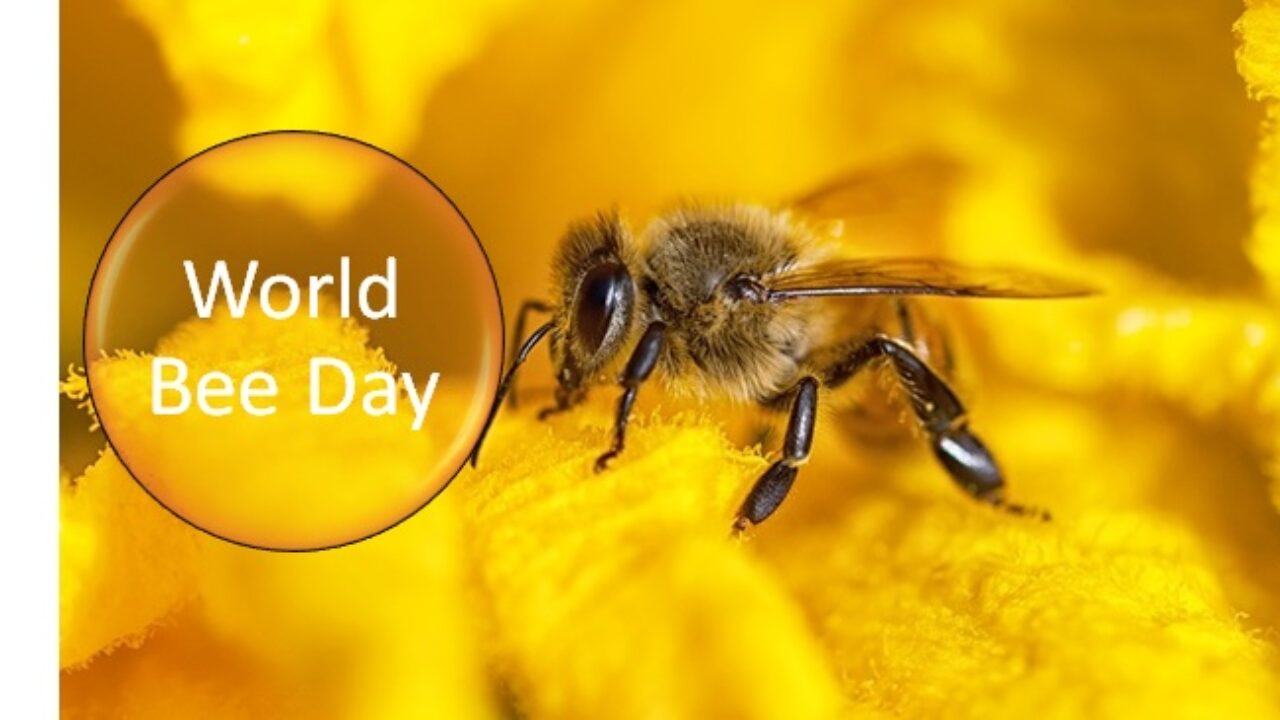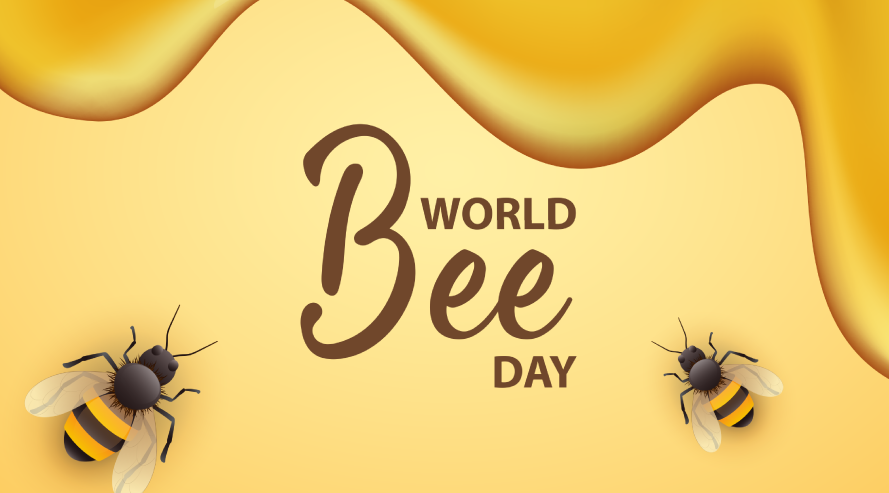Bees are magical creatures which serve mankind in many ways. For centuries these are amongst the hardest working creatures on the planet and have benefited people, plants and the environment. By carrying pollen from one flower to another, bees and other pollinators enable not only the production of an abundance of fruits, nuts and seeds, but also more variety and better quality, contributing to food security and nutrition. There are over 20,000 species of bees in the world. Honey bees gather nectar from four million flowers to make one kilo of honey. Many useful and income generating products that include honey, beeswax, propolis, royal jelly, honeycomb, etc. are obtained from bees. Owing to their immense importance May 20 every year is being celebrated all across the globe as ‘WORLD BEE DAY’.
History
It all started in 2009 by a small group of beekeepers who petitioned for and obtained a formal proclamation by the United States Department of Agriculture (USDA) honoring honey bees and beekeeping. In 2010, a non-profit, Pennsylvania Apiculture Inc. was organized to facilitate and promote the observance better. The original observation date was August 22, 2009 (the fourth Saturday of August), but later on it settled permanently on the third Saturday of August. The UN Member States approved Slovenia’s proposal to proclaim 20 May as World Bee Day in December 2017. The date was chosen as it was the day Anton Janša, a pioneer of modern apiculture, was born. Janša came from a family of beekeepers in Slovenia, where beekeeping is an important agricultural activity with a long-standing tradition.
Honey for Health
Honey is the most beneficial and economically important bee’s product. Honey is a sweet liquid made by bees using the nectar from flowers. Micro organisims does not grow on honey. So, sealed honey does not get spoiled even after hundreds of years. It forms a key ingredient in the Ayurveda and Pharmaceutical sectors in India. It also supports the treatment of several more specific ailments, especially those related to respiratory irritations and infections, mouth sores, eye cataracts, etc. Honey is also being increasingly used as an ingredient in a number of foods such as baked products, confectionary, candy, marmalades, jams, spreads, breakfast cereals, beverages, milk products, etc. Honey does not contain any Fat. About 100 gram of honey contains about 82 gram of Carbohydrates, Vitamin B2 0.038 mg, Vitamin B3 0.121 mg Vitamin b5 0.068 mg, Vitamin B6 0.024 mg, Vitamin C 0.5mg and minerals like Calcium, Iron, Phosphorous, Magnesium, Zinc and Sodium. Besides Honey, the other products obtained from bees include:
- Royal Jelly: It is a secretion from the bees and contains proteins, lipids, carbohydrates, minerals like iron, Sulphur, copper and silicon. It is used as a general tonic and stimulant improving resistance to fatigue, learning capacity and memory, appetite, and general health improvement.
- Beeswax: Beeswax is secreted as a liquid but solidifies when exposed to air. It is chiefly used in the candle industry. Other major places where the bees wax is important are for making creams, ointments, capsules, deodorants, varnish, shoe polish, etc.
- Propolis: Propolis is a mixture of the beeswax and the resins collected by honeybee from plants. It has an adhesive quality and is also used for preparing ointments that treats cuts, wounds, dermatological and cosmetic treatment etc.
- Pollen: It is a mixture of flower pollen, nectar, enzymes, honey, wax and bee secretions. It is loaded with nutrients, amino acids, vitamins, lipids and several active substances. Hence it is increasingly being recognized as a medicine.
- Bee Venom: It contains active chemicals like histamine, hydrochloric acid, formic acid, apamine, etc. It is injected into patients suffering from rheumatism. It also helps in curing neuralgia, arthritis, necrosis, etc.
Theme of the WBD 2023
The day every year is celebrated with a particular theme highlighting the importance of these creatures in our lives and in our environment. The theme for the year 2023 World Bee Day is ‘Bee engaged in pollinator-friendly agricultural production’ as decided by Food and Agriculture Organization (FAO) of the United Nations (UN). The theme thus calls for global action to support pollinator-friendly agricultural production and the importance of protecting bees and other pollinators, particularly through evidence-based agricultural production practices.
Role in Agriculture
In agriculture these tiny creatures not only contribute to the pollination of wildflowers, but also to the pollination of agricultural crops. Pollination has a positive impact on the environment in general, helping to maintain biodiversity and the vibrant ecosystems upon which agriculture and humanity depend. A wide variety of plants critical to human well-being and livelihoods require pollinators. In fact, bees and other pollinators provide the important ecosystem service of ensuring out-crossing (that is, crossing genes) and, thus, reproduction of many cultivated and wild plants. According to an estimate, bees and other pollinators pollinate almost 90% of flowering plants and 70% of the world’s main crops. Without bees, these numbers would fall to decline. These thus have also a role in maintaining biodiversity.
Status of Honey Production in India
Six species of bees of commercial importance are found in India; Apis Dorsata (Rock bee), the Himalayan species (Apis laboriosa), Apis Cerana Indica (Indian hive bee), Apis Florea (dwarf bee), Apis Mellifera (European or Italian Bee), and Tetragonula Iridipennis (Dammer or stingless bee). In India the top honey production states are Uttar pradesh, Punjab, Gujarat, Bihar and Madhya Pradesh. According to the advance estimates India’s production of Honey has touched about 133,200 metric tonnes in 2021-22 catapulting India to the second spot in the world behind China. India, is also one of the world’s top honey exporters and exported 74,413 MT of honey in 2021–2022 for a total of Rs 1221.17 crore.
Government’s Initiatives
To promote bee keeping in the country, the National Bee Board was constituted in the year 2000 by the Small Farmers’ Agri-business Consortium (SFAC) with the objective to develop beekeeping in India and improve it. The board was registered as a ‘society’ following the guidelines of the Societies Registration Act, 1860. It was reconstituted in June 2006. The board is currently engaged in the implementation of the Horticulture Mission for North East and Himalayan State (HMNEM) and the National Horticulture Mission (NHM). The National Bee Board has its headquarters in New Delhi, India. The Government of India is also promoting beekeeping to double farmers’ income. A ‘Honey Mission’ has been launched as a part of Sweet revolution. A sum of rupees 500 crores has been allocated towards bee keeping under ‘Atmanirbhar Bharat Abhiyan’.
Bee keeping as a profitable economic activity
Beekeeping is a sustainable activity since it provides nutritional, economic and ecological balance, while providing employment and income. India has a good potential for beekeeping and to become a major honey exporting nation. The distinctive feature of bee- keeping is the small capital investment required as compared to other industries and the income obtained from its by products also. It has the capacity to offer direct employment to lakhs of people especially hill dwellers, tribal and unemployed youth and farmers. Sustainability of this industry is of prime importance for development and economic well being of the country.
On this all important day, let all of us endaveour to raise awareness of the importance of bees and avoid all such human activities which are a threat to these fascinating insects.
(The author is a faculty of SKUAST-K and can be reached at: [email protected])








